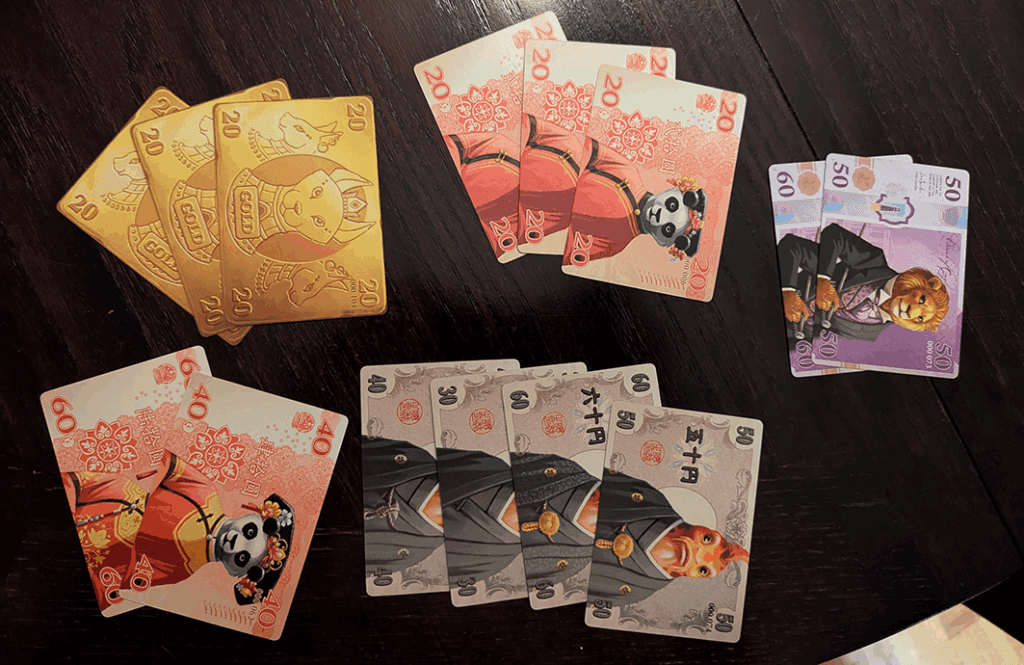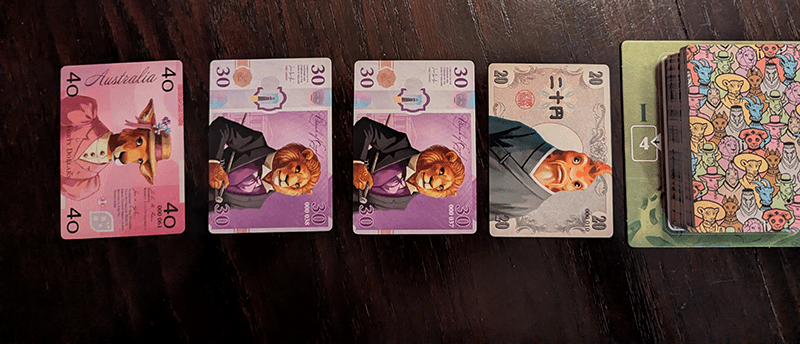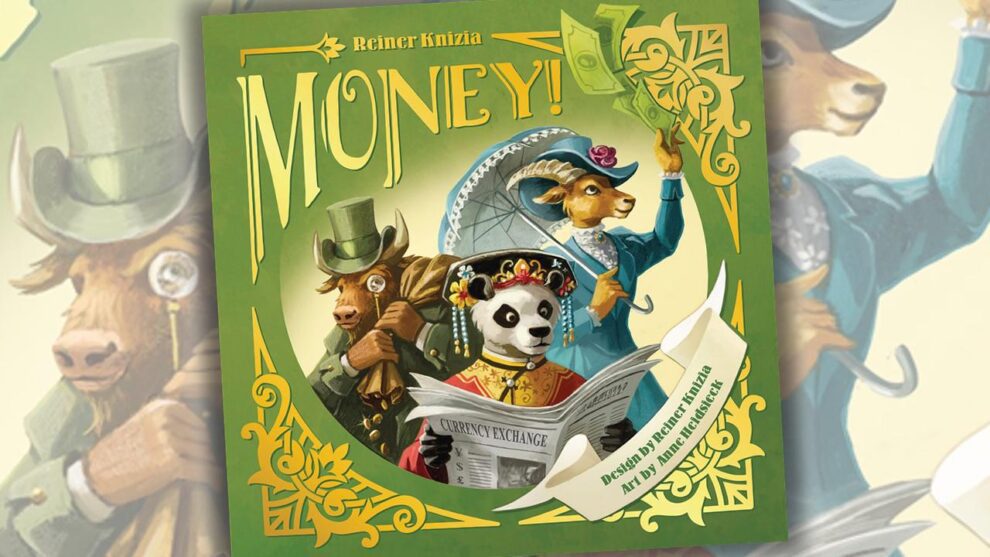Disclosure: Meeple Mountain received a free copy of this product in exchange for an honest, unbiased review. This review is not intended to be an endorsement.
You know something’s up with the board game industry when publishers start raiding the retirement home of forgotten titles just to fill their 2025 release calendar. And somehow, Reiner Knizia is at the center of it all, cashing checks like it’s still 1999. From dusty classics to out-of-print curiosities, he’s enjoying a full-blown reprint renaissance. With the sheer volume of new games flooding the market, it’s no surprise that publishers are digging through his back catalog like it’s buried treasure.
Money! is an odd one for me. I played it religiously on my iPhone during the 2000s, right alongside Samurai, Poison, and Ra. At the time, I barely paid attention to who designed what. I just knew these games were clever, quick, and replayable. It wasn’t until much later that I realized all four came from the same source: our favorite German doctor, Reiner Knizia.
I never played or owned the physical version of Money!, and as far as I know, it’s been out of print longer than the average Fortnite player has been alive. After a handful of plays with the new edition, I’m a little disappointed. But first, let’s talk about what Money! actually is.

Knizia Cash Grab
Story? Well, sort of. You are collecting currency, I guess. The game is vague on the details. The goal is to gather sets of money cards that meet certain thresholds in order to score points, but nothing is scored until the end. Each round, you use cards from your hand to bid in auctions, swapping them with other players or with the cards available in the market. At its core, Money! is about managing your hand and making the right trades to end up with the most valuable collection by the time the game ends.
Here’s how it works. Each player starts with a hand of money cards, drawn from a deck representing different currencies. There are two “public piles” at the start of each round. Everyone secretly selects cards from their hand to make a bid, then all bids are revealed at once. The highest bid goes first and may swap their bid cards for one of the public piles or with another player’s bidding cards. The next highest does the same, and so on. Once everyone has taken a pile, the round ends. This process repeats until the deck runs out, signaling the end of the game.
Scoring is what makes Money! tick. While the cards show currency denominations, they don’t actually mean anything until you meet certain thresholds. Have less than 100 in one currency? Too bad, that entire stack is worth zero. If you reach between 100 and 199, you only score the amount above 100. Cross 200, and you get the full value of every card in that set.
But that’s not all. If you collect three cards of the same denomination in the same currency, like three 20s or three 30s, you earn a bonus. Gold and Silver cards always score. The whole system encourages tight, focused sets while punishing scattershot collecting. It’s a clean bit of Knizia math, and easily the most satisfying part of the game.
Small Box, Big Convenience
Certain parts of Money! stand out in a good way. First of all, I’m quite glad that this filler game actually feels like a filler. There isn’t a huge setup process or a bazillion tokens to be concerned about. It’s a simple deck that you shuffle, give a few to each player, and set up your public piles. Done.
AllPlay has certainly gone out of their way to make this version as approachable as possible. There are player aids that explain not only the round structure and available actions, but also how endgame scoring works. The scoresheet is dry-erase, so no more pads of paper to burn through.
Of course, we play board games for the game itself, not the components. And to its credit, Money! is extremely well-balanced. It is not the kind of game with dominant strategies or some unintuitive meta you need to memorize.

Efficient, But Empty
Everything comes down to gaining majorities in specific currencies and keeping an eye on what your opponents are collecting. In a strange way, it almost feels like an area control game, just without the areas or a board. You are fighting for space in the currencies themselves, and every swap, bid, and pickup shifts the balance.
Great board games give players space to express themselves. The rules and mechanics act as a framework, but the best games let you interpret that framework in your own way. You can bluff, pressure, pivot, or pursue a plan that feels uniquely yours.
Money! does not offer that. The game is not interested in your style or your creativity. There is really only one correct way to play, and that lack of flexibility can feel oddly dehumanizing. It wants you to memorize what other players are collecting and calculate whether it is worth blocking them. Each bidding round becomes a puzzle of efficiency, where you are trying to extract value without giving away too much. It starts to feel less like a game and more like running an algorithm.
No Interest Accrued
And this is why I feel lukewarm about Money! I do not dislike it, but I do not care for it either. It sits in this strange emotional purgatory. It is like getting a breakup text from someone you were planning to break up with anyway. You are not upset. You are not relieved. You just feel nothing. That is the experience Money! gives me. It plays fine. It works. But it leaves me cold.
I get why Money! is getting a second life. It’s easy to teach, quick to play, and has just enough Knizia flavor to satisfy a certain kind of player. But for me, it’s a game that feels more interesting on paper than it does at the table. I respect it, but I don’t enjoy it. And in a year packed with reprints and reimaginings, I can’t help but hope we get fewer polished fossils and more games that actually feel alive.











